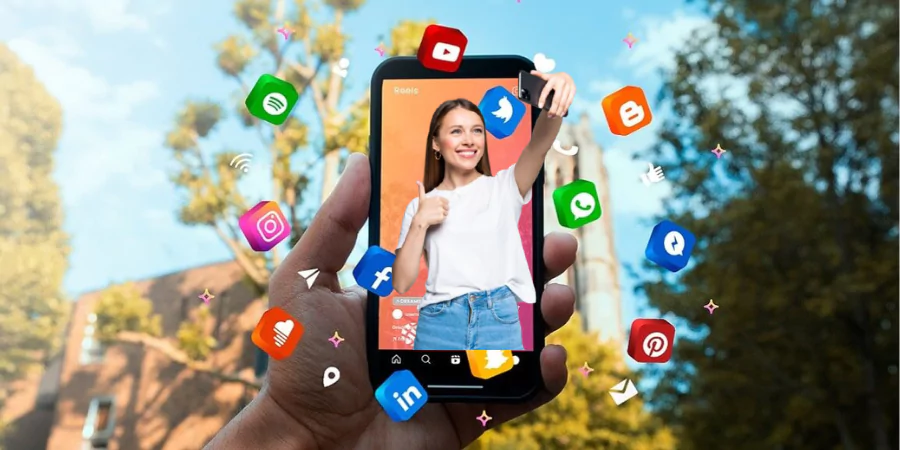Welcome to the wild world of influencers, where social media turned everyday individuals into global stars and trendsetters. It’s a phenomenon that has reshaped how we perceive fame and celebrity in the digital age. With just a smartphone and an internet connection, anyone can captivate millions, sharing their lives through carefully curated posts. But beneath the glamorous facade lies a complex reality—one filled with both breathtaking highs and jaw-dropping lows.
As we dive into this captivating landscape, we’ll explore everything from influencer culture’s meteoric rise to its darker undertones. We’ll take you behind the scenes of what it really means to be an influencer while shedding light on some shocking controversies that have made headlines. How do these figures shape our society? And should they be held accountable for their actions? Stick around as we unravel these questions and more in this exploration of #InfluncersGoneWild!
The Rise of Influencers: How Social Media Changed the Game
The rise of influencers has transformed the landscape of marketing and communication. Social media platforms like Instagram, TikTok, and YouTube provide a stage for anyone with charisma and creativity to shine.
Gone are the days when fame was reserved for movie stars or musicians. Today, ordinary people can build massive followings by sharing their passions, whether it’s fashion, fitness, travel, or lifestyle.
Brands quickly recognized this shift. Influencers have become valuable assets in advertising campaigns. Their authentic connections with audiences lead to increased trust and engagement.
With algorithms favoring relatable content over polished advertisements, influencer culture thrives on authenticity. This new approach resonates deeply with consumers who crave genuine interactions online.
As influencers carve out their niches in various industries, they redefine what success looks like in the digital age—an era where influence is just as powerful as traditional celebrity status.
The Dark Side of Influencer Culture
The allure of influencer culture often masks a troubling underbelly. Behind the polished images, mental health struggles can run deep. Many influencers grapple with anxiety and depression as they chase likes and followers.
Pressure to maintain an idealized persona is immense. The constant scrutiny can lead to burnout, leaving some feeling trapped in a cycle of self-promotion.
Moreover, authenticity becomes diluted in this quest for fame. Brands pay hefty sums for endorsements, which sometimes leads influencers to promote products that don’t align with their values or beliefs.
This disconnect raises ethical questions about trustworthiness. Followers may unknowingly support misleading narratives while seeking genuine connection.
As trends shift rapidly, many influencers find themselves scrambling to stay relevant. This relentless pace contributes to toxic competition within the community—often at the expense of personal integrity and honesty.
Behind the Scenes: The Reality of Being an Influencer
Behind the glamour and filtered photos lies a different story. Many influencers face immense pressure to maintain their online persona. The constant need for content leaves little room for downtime.
Creativity can feel like a job, not an expression. Hours are spent planning posts, editing videos, and engaging with followers. It’s not just about snapping pretty pictures; it’s about strategy.
Collaboration is another layer of complexity. Working with brands often means navigating contracts and expectations that can be overwhelming. Influencers must balance authenticity with commercial interests.
Mental health struggles are common in this world too. The fear of judgment from followers looms large, creating anxiety that affects personal lives.
Support systems become crucial amidst these challenges. Friends or fellow creators provide understanding in a space where perceptions often overshadow reality.
When Going Wild Goes Wrong: Controversies and Scandals Involving Influencers
The influencer world isn’t just glitz and glamour. It can be a minefield of controversies that leave audiences shocked. Think about the infamous Fyre Festival, where influencers hyped up a luxurious event that turned out to be a disaster. Many lost money, trust, and faith in social media marketing.
Then there’s the issue of authenticity. Some influencers have faced backlash for promoting products they don’t actually use or believe in. Followers feel betrayed when they discover these endorsements are more about profit than genuine passion.
Scandals also arise from personal behavior. From inappropriate comments to wild parties shared on social platforms, some influencers find their careers derailed overnight due to impulsive actions captured by cameras.
These incidents reveal how quickly an image can shift from aspirational to problematic, leaving both fans and brands questioning their loyalty.
Impact on Society: How Influencers Affect our Culture and Behavior
Social media influencers have become powerful figures in shaping our culture. Their reach extends far beyond personal brands; they influence trends, fashion choices, and even lifestyle habits.
The impact is particularly evident among younger audiences who often look to these digital celebrities for guidance. Whether it’s adopting a new skincare regimen or embracing a particular diet, influencers spark conversations that ripple through society.
Moreover, the portrayal of extravagant lifestyles can skew perceptions of reality. Followers may feel pressured to replicate these idealized lives, leading to issues like anxiety and self-esteem challenges.
On the flip side, some influencers use their platforms for positive change—raising awareness about social issues or promoting mental health resources. This duality reflects the complex role that influencers play in modern culture.
As we navigate this influencer-driven landscape, it’s clear they hold significant sway over behaviors and societal norms.
Ethical Considerations: Should We Hold Influencers Accountable?
The influence of social media personalities is undeniable. With millions of followers, their opinions shape trends and behaviors. But should they be held accountable for their actions?
As public figures, influencers wield significant power. Their endorsements can sway consumer choices and even affect mental health. When they promote unrealistic lifestyles or products without transparency, it raises ethical questions.
Many argue that accountability must extend to influencers just like any other public figure. Misleading content can have real-world consequences—especially among impressionable audiences.
However, defining the boundaries of responsibility is tricky. Are influencers merely entertainers? Or do they carry a moral obligation to their followers?
Engaging in open dialogue about these issues could lead to healthier practices within influencer culture. The conversation around ethics isn’t just necessary; it’s crucial in shaping the future landscape of social media influence.
Conclusion: Finding Balance in the World of Influ
The world of influencers is a captivating but complex landscape. As we navigate this vibrant realm, it’s essential to recognize the duality that exists within it. On one hand, influencers have the power to inspire and motivate their followers, shaping trends and sparking conversations around issues that matter. They can elevate brands while also shining a light on causes close to their hearts.
However, as with any powerful force, there are pitfalls. The allure of fame can lead some down troubling paths; controversies erupting from impulsive decisions often overshadow genuine contributions. This dichotomy forces us to consider our relationship with social media figures closely.
Finding balance in this world means being discerning consumers of content ourselves. It invites us to appreciate authenticity while questioning motives behind polished posts and curated lives. Society thrives when individuals engage thoughtfully with what they consume online – recognizing both the impact influencers wield and the responsibility they bear.
As followers or aspiring creators, fostering accountability alongside creativity will be key moving forward. Embracing a culture where honesty prevails over hype allows for growth not just among influencers but within society at large too. Balancing admiration with critical thinking ensures influencer culture evolves into something more meaningful—where inspiration does not come at the cost of integrity or well-being for anyone involved.



















